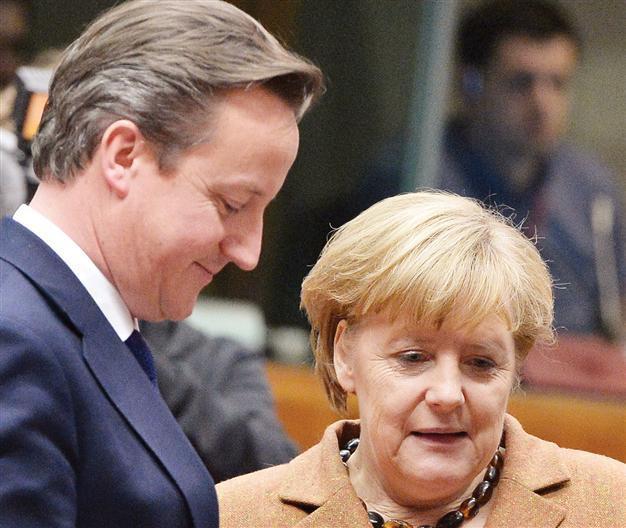EU divided over cuts offer by British premier
BRUSSELS

Cameron (L) and Merkel scramble to find an all-but-impossible deal.
A European Union summit charged with agreeing on a long-term budget for the 27-nation bloc, which was shadowed by a large dispute between the United Kingdom and Germany, broke up without a deal, the Associated Press reported on Nov. 23. At the end of the summit, Cameron accused Brussels of “living in a parallel universe.”Britain was calling for billions of euros in cuts to European Union officials’ pay and pensions, a move that has support in Britain and other northern European countries before the summit, risking blocking attempts to reach a long-term EU budget deal.
European Council President Herman Van Rompuy, who presides over the summits, that the national leaders had told him and European Commission President Jose Manuel Barroso to continue working toward consensus over the coming weeks.
Van Rompuy said the “constructive discussions” at the summit meant that an agreement could be reached early next year.
Barroso, too, called the talks constructive. But he added, “we are not yet at the point of reaching consensus.”
The prospect of failure had loomed over the EU leaders’ summit, charged with agreeing on a 1 trillion euro ($1.25 trillion) long-term spending plan for the 27-country bloc, even before the meeting began.
U.K. Prime Minister David Cameron, who wants a real-terms freeze in EU spending between 2014 and 2020, is pushing for the EU to cut its wage bill by 10 percent, push officials’ retirement age up to 68 from 63 and reduce generous pensions benefits.
The measures would cut around 6 billion euros from the 7-year budget, British officials say, a fractional amount in actual terms but one with heavy symbolic value at a time when all EU countries are struggling to keep budgets in check.
Cameron upsets bloc
Cameron, trailing in the polls on the back of unpopular public spending cuts and weak growth, said Europe had to reduce “unaffordable spending” if it was to retool its economy.
The prime minister criticized Brussels harshly and said there could not be a “deal at any cost.”
Speaking at the end of the failed summit Cameron said: “We’re not going to be tough on budgets at home just to come here and sign up to an increase.”
“Frankly the deal on the table was just not good enough. It wasn’t good enough for Britain and neither was it good enough for a number of countries, The Daily Telegraph quoted him as saying. “In the UK we are cutting admin budgets by as much as a third, civil service staff by 10 percent in two years. None of this has been easy. Meanwhile Brussels continues to exist as if it is in a parallel universe.”
Cameron’s demand for more cuts, coupled with a pledge to protect Britain’s cherished annual EU rebate, has upset the European Commission, the EU’s executive, and some leaders.
15 of the EU’s most financially and economically vulnerable countries have joined forces to oppose any cuts to funds earmarked for economic growth and development, Reuters reported.
Meanwhile, Germany’s Parliament passed the same day country’s new budget, which foresees flat spending and slightly lower borrowing next year. The majority of Chancellor Angela Merkel’s coalition lawmakers voted on Nov. 23 for the 2013 budget, which sees spending at 302 billion euros ($390 billion) and includes new borrowing of euros 17 billion.
















